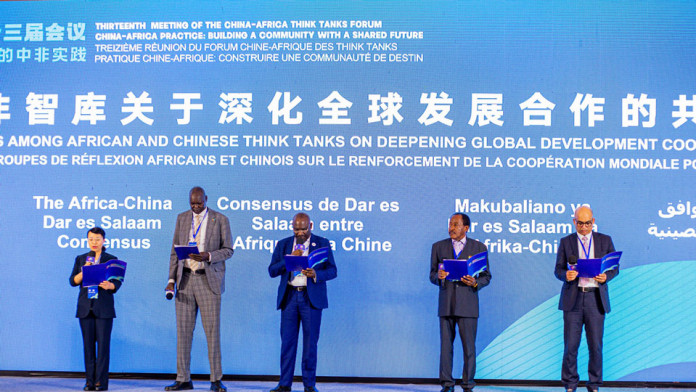By Alpha Mohamed Jalloh, Director of the China Africa Institute, University of Makeni
The Africa-China Dar es Salaam Consensus
In the face of current global challenges, there remains a beacon of hope for peace and progress through enhanced collaboration. Recognizing the interdependence of human society, particularly in sharing both positive and negative experiences, African and Chinese think tanks have emphasized the need for deeper cooperation and consensus in global development.
During the 13th Meeting of the China-Africa Think Tanks Forum, a consensus was reached on improving knowledge-sharing, ideological unity, and cultural co-prosperity. This agreement calls on the international community to foster development cooperation rooted in mutual respect, solidarity, win-win cooperation, openness, and shared prosperity. China and Africa, as pivotal members of the Global South, are committed to active participation in international governance, encouraging modernization, and building a global community with a shared future.
Key Priorities for Development Cooperation
- Prioritizing Development and Autonomous Pathways: The consensus advocates for the Global Development Initiative’s implementation, promoting values such as justice, fairness, democracy, peace, and freedom. Nations are encouraged to explore modernization models tailored to their unique cultural and developmental needs, fostering communication over confrontation and sharing governance best practices.
- Promoting a Multipolar and Equitable World: There is a call for a more democratic international system that amplifies the voices and representation of developing nations. The consensus supports the protection of national sovereignty, territorial integrity, and development rights, aiming to rectify historical injustices faced by Africa and promote equal development opportunities.
- Inclusive Economic Globalization: Emphasizing the removal of trade barriers and the strengthening of global economic governance, the think tanks advocate for a robust, inclusive global supply chain. This approach aims to harness the comparative advantages of African nations, advance industrialization, modernize agriculture, and enhance participation in the global economy.
- Reforming the International Financial System: The consensus calls for active reform of the international financial system, including increased capital for development banks like the World Bank. There is also a push for greater voting and shareholding rights for emerging markets and developing nations within the International Monetary Fund (IMF), and the creation of a third executive director seat for African countries.
- Sustainable Development Bonds: Aligning with initiatives such as the Belt and Road Initiative (BRI), the African Union’s Agenda 2063, and the United Nations’ 2030 Agenda for Sustainable Development, the consensus emphasizes the importance of infrastructure connectivity and high-tech sector advancement. The approach to climate change and green development is guided by the principle of “common but differentiated responsibilities” (CBDR).
- Stimulating Domestic Development: Effective governance, macroeconomic regulation, and public services are highlighted as crucial for promoting market vitality. The consensus supports the industrialization of African agriculture and the protection of enterprises’ rights, advocating for trade and investment liberalization and new financing models to enhance liquidity and fund utilization.
- Creating a Secure Development Environment: Addressing both traditional and non-traditional security concerns, the consensus calls for respect for nations’ legitimate security concerns, conflict resolution through negotiation, and the prevention of security traps that hinder growth. The Global Security Initiative is seen as a pathway to global peace and security.
- Knowledge Exchange and Mutual Learning: The consensus underscores the importance of efficient policies to promote knowledge exchange, enhancing the Global Civilization Initiative’s implementation. Strengthening the network of think tank alliances, boosting collaboration between think tanks and media, and advancing scientific, technological, health, cultural, and artistic exchanges are key goals. The China-Africa cooperation plan on talent development aims to cultivate qualified personnel for sustainable progress.
Through these commitments, African and Chinese think tanks are poised to advance global development cooperation, fostering a future of shared prosperity and mutual respect.




